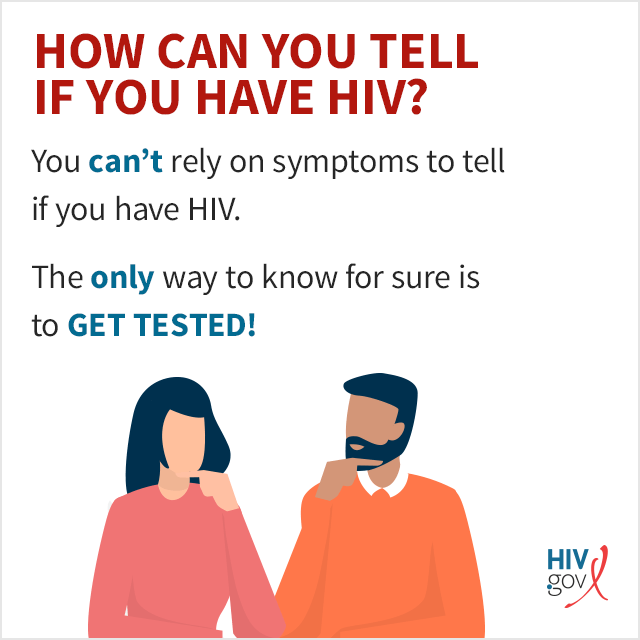Symptoms of HIV

How Can You Tell If You Have HIV?
The only way to know for sure if you have HIV is to get tested. You can’t rely on symptoms to tell whether you have HIV.
Knowing your HIV status gives you powerful information so you can take steps to keep yourself and your partner(s) healthy:
- If you test positive, you can take medicine to treat HIV. People with HIV who take HIV medicine (called antiretroviral therapy or ART) as prescribed and get and keep an undetectable viral load can live long and healthy lives and will not transmit HIV to their HIV-negative partners through sex. An undetectable viral load is a level of HIV in the blood so low that it can’t be detected in a standard lab test.
- If you test negative, you have more HIV prevention tools available today than ever before, like pre-exposure prophylaxis (PrEP), medicine people at risk for HIV take to prevent getting HIV from sex or injection drug use, and post-exposure prophylaxis (PEP), HIV medicine taken within 72 hours after a possible exposure to prevent the virus from taking hold.
- If you are pregnant, you should be tested for HIV so that you can begin treatment if you're HIV-positive. If you have HIV and take HIV medicine as prescribed throughout your pregnancy and childbirth and give HIV medicine to your baby for 4 to 6 weeks after giving birth, your risk of transmitting HIV to your baby can be less than 1%. HIV medicine will protect your own health as well.
Use the HIV Services Locator to find an HIV testing site near you.
HIV self-testing is also an option. Self-testing allows people to take an HIV test and find out their result in their own home or other private location. You can buy a self-test kit at a pharmacy or online, or your health care provider may be able to order one for you. Some health departments or community-based organizations also provide self-test kits for a reduced cost or for free. Learn more about HIV self-testing and which test might be right for you.
What Are the Symptoms of HIV?
There are several symptoms of HIV. Not everyone will have the same symptoms. It depends on the person and what stage of the disease they are in.
Below are the three stages of how HIV progresses and some of the symptoms people may experience. Having symptoms alone does not mean you have HIV – other illness can cause similar symptoms. And some people have no symptoms at all. The only way to know if you have HIV is to get tested.

Symptoms can last anywhere from a few days to several weeks. But some people do not have any symptoms at all during this early stage of HIV.
Don’t assume you have HIV just because you have any of these symptoms—they can be similar to those caused by other illnesses. But if you think you may have been exposed to HIV, get an HIV test.
Here’s what to do:
- Find an HIV testing site near you—You can get an HIV test at your primary care provider’s office, your local health department, a health clinic, or many other places. Use the HIV Services Locator to find an HIV testing site near you.
- Request an HIV test for recent infection—Most HIV tests detect antibodies (proteins your body makes as a reaction to HIV), not HIV itself. But it can take a few weeks after you have HIV for your body to produce these antibodies. There are other types of tests that can detect HIV infection sooner. Tell your doctor or clinic if you think you were recently exposed to HIV and ask if their tests can detect early infection.
- Know your status—After you get tested, be sure to learn your test results. If you’re HIV-positive, see a health care provider as soon as possible so you can start treatment with HIV medicine. And be aware: when you are in the early stage of infection, you are at very high risk of transmitting HIV to others. It is important to take steps to reduce your risk of transmission. If you are HIV-negative, there are prevention tools like pre-exposure prophylaxis (PrEP) that can help you stay negative.